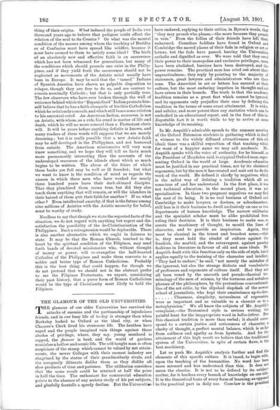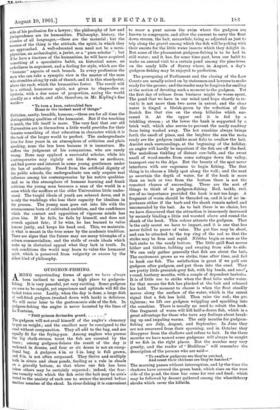THE GLAMOUR OF THE OLD UNIVERSITIES.
THE glamour of our older Universities has survived the attacks of enemies and the partisanship of injudicious friends, and in our busy life of to-day is stronger than when Berkeley looked to Oxford as the ideal city, or when Chaucer's Clerk lived his strenuous life. The heathen have raged and the people imagined vain things against those abodes of privilege, where, they say, young manhood is sapped, the jiaseur is bred, and the world of gardens nourishes a hollow and scenic life. The self-taught man is often suspicions of the stamp which cannot be valued by net attain- ments, the newer Colleges with their earnest industry are chagrined. by the status of their grandmotherly rivals, and the arrogantly illiterate dislike them as they dislike all slow products of time and patience. The utilitarian considers that the same result could be attained at half the price in half the time. The enthusiast for commercial education points to the absence of any serious study of his pet subjects, and gleefully foretells a-speedy decline. But the Universities have endured, replying to their critics, in Byron's words, that "they may preach who please,—the more because they preach in vain." Even the follies of their friends have left them unharmed. Countless faddists have found in Oxford and Cambridge the sacred places of their fads in religion or art or letters, but the fads have passed, leaving the Universities catholic and dignified as ever. We were told that they owed their power to their monopolies and exclusive privileges; testa have been abolished, barriers have been destroyed, and the power remains. The practical man has cried out about their unpracticahress ; they reply by pointing to the majority of statesmen, great lawyers and administrators who are their sons. The Anarchist in art or letters has sneered at their culture, but the most enduring impulses in thought and art have arisen in their bounds. The truth is that the academic tradition remains as a great fact which cannot be ignored, and its opponents' only prejudice their case by defining this tradition in the terms of some exact attainment. It is wider, and subtler; and more -potent than any statistics which can be embodied in an educational report, and in the face of this in. disputable fact it is worth while to try to arrive at some knowledge of its meaning.
In Mr. Asquith's admirable speech to the summer meeting of the Oxford Extension students (a gathering which is itself a witness to the widely diffused attractiveness of this old ideal) there was a skilful exposition of that teaching which for want of a happier name we may call academic. Mr. Asquith speaks with the voice of authority, for he himself, as the President of Magdalen said, is atypical Oxford man, repre- senting Oxford in the world at large. Academic education must be justified in our practical times, not by its cloistered exponents, but by the men it has created and sent out to do the work of the world. He defined it chiefly by negatives, which is the safest way of defining a tradition which all are conscious of and few understand. In the first place, it was not technical education; in the second place, it was not specialisation. In these two pregnant negatives we may find the root of its being. It is no real business of Oxford and Cambridge to make lawyers, or doctors, or schoolmasters; still less is it their business to, dwell exclusively on one or two departments of human knowledge. The narrow utilitarian and the specialist scholar must be alike prohibited from ruling their destinies. It is their business to make men, to create the machinery of thought, to mould the lines of character, and to provide an inspiration. Again, they must be classical in the truest and broadest sense,—that is, they must hold the citadel of culture against the freakish, the morbid, and the extravagant, against passing fashions in literature in favour of old and sane ideals. Mr. Asquith dealt with this function only on the side of style, but it applies equally to the training of the character and intellect " They had to endure," he said, " not merely the mistakes of the ignorant, but also the strange dialects and vocabularies of professors and exponents of culture itself. Had they not all been vexed by the uncouth and pseudo-classical ter- minology of the men of science, by the tortuous and nebulous phrases of the philosophers, by the pretentious conventionali- ties of the art critic, by the slipshod slapdash of the newest school of journalists, who kept their omniscience up-to-date.
Clearness, simplicity, naturalness of expression, were as important and as valuable to a chemist as to a metaphysician." We all know the subjects of Mr. Asquith's complaint,—the Tentonised style in serious writing, the painful hunt for the inappropriate word in belles-lettres. Bat this classical tradition is more than verbal; it should corm- spond to a certain justice and seriousness of character, a clarity of thought, a perfect mental balance, which is as far from coldness and apathy as from hysteria. And for the attainment of this high result we believe that the traditional system of the Universities, in spite of certain flaws, is the best machinery.
Let us push Mr. Asquith's analysis further and find the elements of this specific culture. It is based, to begin with, upon the teaching of the humanities. No word has been more misused and less understood than this. It does not mean the classics. It is not to be defined by its subject- matter, for it borders every branch of knowledge on one side. It is the theoretical basis of every form of learning, as opposed to the practical part in daily use. Case-law is the practical side of his profession for a lawyer; the philosophy of law and jurisprudence are its humanities. Philosophy, history, the classics of all languages,—these are the material ; but the essence of the thing is the attitude, the spirit, in which they are approached. A well-educated man need not be a meta- physician, an archaeologist, a jurist, or a "pure scholar " ; but if he have a tincture of the humanities, he will have acquired something of a speculative habit, an historical sense, an orderliness in argument, and a feeling for style, which are the humane" aspects of each branch. In every profession the man who can take a synoptic view is the master of the man who stumbles along by rule of thumb, and it is this standpoint, above the rack, which the humanities foster. The result will be a critical, humorous spirit, not given to rhapsodies or hysteria, with a due sense of proportion, seeing the world steadily as a whole, and able, therefore, in Mr. Kipling's fine words— "To turn a keen, untroubled face
Home to the instant need of things."
Criticism, sanity, breadth, humour,—these are for all time the distinguishing qualities of the humanist. But if the teaching is much, the life itself is more. The very fact that our old Universities are in themselves a little world provides for their inmates something of that education in character which it is the task of the larger world to perfect. The undergraduate lives for four years in an atmosphere of criticism and plain speaking, none the less keen because it is immature. He suffers the judgment of his companions, who are rarely wrong. Dons may applaud a successful scholar, while his contemporaries may rightly set him down as mediocre, and find power and interest in some young gentleman under the ban of authority. Freed from the artificial dignity of the public schools, the undergraduate can only acquire real influence among his contemporaries by his native qualities- And so in this atmosphere of humane learning and frank criticism the young man becomes a man of the world in a sense which the scoffers at the older Universities little under- stand. The turgid ideals of youth are sobered down, and it is only the weaklings who lose their capacity for idealism in the process. The young man goes out into life with the strenuousness born of cultivated ambition, and the confidence which the contact and opposition of vigorous minds has given him. If he fails, he fails by himself, and does not screech against fate ; if he wins, he has learned to value honour justly, and keeps his head cool. This, we maintain, is what is meant in the true sense by the academic tradition. There are signs that the future may see many triumphs of a solemn commercialism, and the strife of crude ideals which make up in rhetorical appeal what they lack in truth. In such conditions the world may learn to value the humanist spirit, which is preserved from vulgarity or excess by the oldest kind of philosophy.



































 Previous page
Previous page